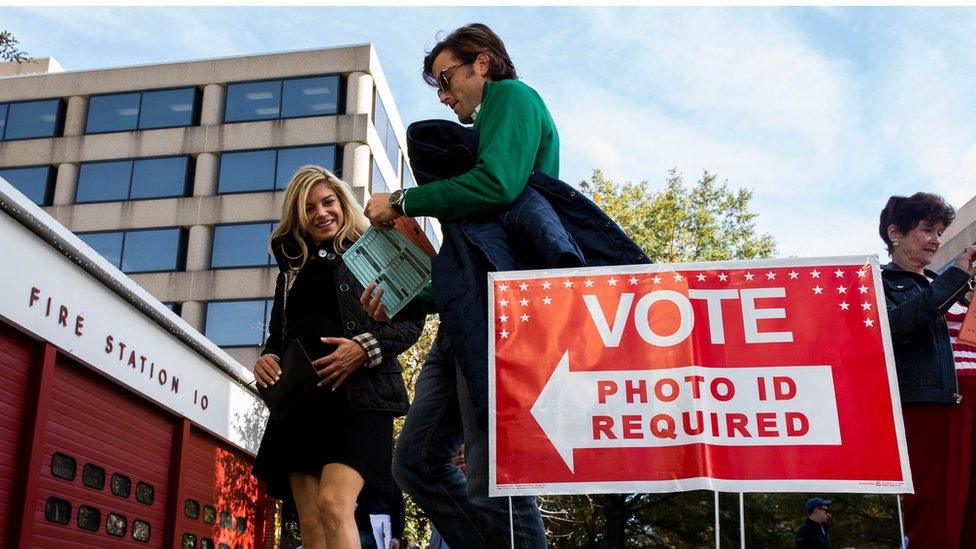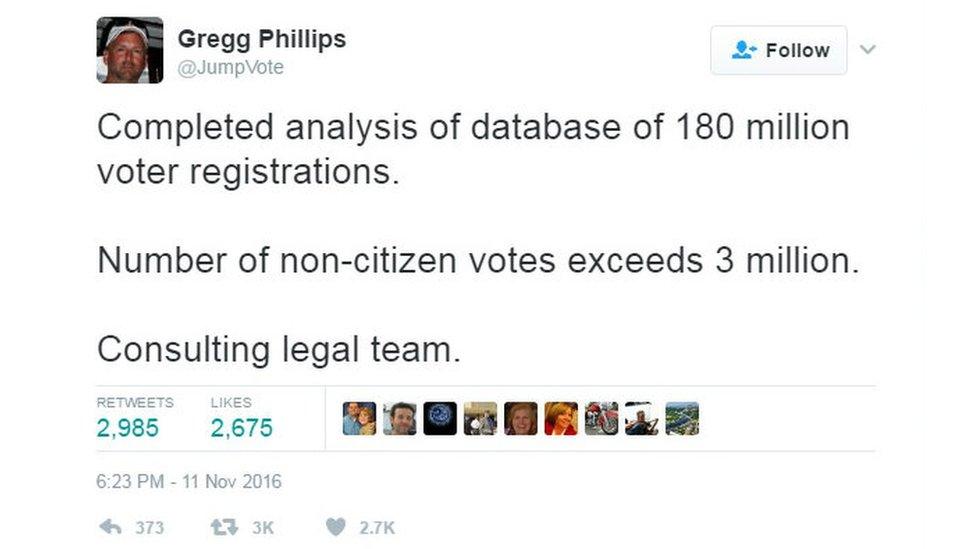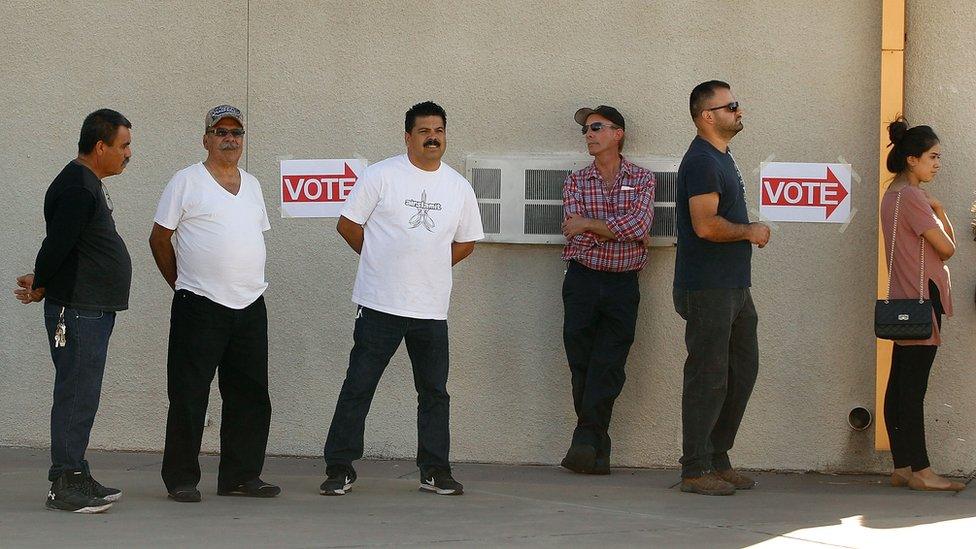Gregg Phillips: The man claiming 3m illegal votes
- Published

More than 130m Americans voted on 8 November - President Trump believes millions did so fraudulently
Donald Trump and his aides say that between three and five million people voted illegally in the 2016 election. One man has emerged as the originator of that claim: Gregg Phillips.
On Friday morning, President Trump's first tweet of the day read, "Look forward to seeing final results of VoteStand. Gregg Phillips and crew say at least 3,000,000 votes were illegal. We must do better!"
Since taking office, the president and his staff, most notably press secretary Sean Spicer, have repeated claims of mass voter fraud and on Wednesday, Trump promised, external a "major investigation" in response.
So where did this figure of three million illegal votes come from and who is Gregg Phillips?
The man
Phillips is a staunch conservative, external who began his work in government by campaigning for Mississippi Governor Kirk Fordice in the mid-1990s.
He subsequently became head the Mississippi Department of Human Services, but resigned a year later over conflict-of-interest claims, external levelled against him. He next became the deputy commissioner for Texas' Health and Human Services, before leaving public life to found his own companies.
Long-time Clarion-Ledger investigative reporter Jerry Mitchell says he is still known in political circles in Mississippi.
"When I found out he was the one who [tweeted] this I was like, 'You're kidding me,'" says Mitchell. "Gregg has always been great at spinning things."
Phillips did not return a request for comment from BBC News.
The Associated Press reports that Phillips was listed on the voter rolls in Alabama, Texas and Mississippi, according to voting records and election officials in those states.
But records show he voted only in Alabama in November.

The claim
Phillips is a board member of True the Vote, a conservative nonprofit that tracks voter fraud, and the owner of a technology company called AutoGov.
One of his products, called VoteStand, is intended to help users "quickly report suspected election illegalities as they happen". The app, external lets people take photos of irregularities they see at polling places, and sends the report back to VoteStand.
On 11 November, 2016, just days after the election, Phillips wrote on Twitter, external, "Completed analysis of database of 180 million voter registrations. Number of non-citizen votes exceeds 3 million. Consulting legal team."
On 13 November, he clarified further: "We have verified more than three million votes cast by non-citizens."
The claims were retweeted and liked thousands of times. They became the basis of an article, external on the conspiracy theory news site InfoWars.
Later, Trump himself began tweeting that he would have won the popular vote, were it not for millions of illegal votes.
When reporters first approached Phillips asking if he had influenced the president-elect's thinking, Phillips demurred.
"When did a tweet become news?" he told the Austin American-Statesman, external.
The proof
Phillips says the figure is based on 189 million voting records he and "a group of volunteer election integrity researchers" have collected from voter files around the country.
He further explained his methodology to CNN anchor Christopher Cuomo on Friday.
"We've augmented that database with everything from geo-coding to all sort of identifying information we've developed, algorithms that allow us to to first verify identity," he told Cuomo, external.
"We can verify residency, we can verify citizenship, felon status, and all of the other factors that go into making a legal, registered vote."
But Phillips has repeatedly refused to show his work. He says he will reveal, external his raw data, his algorithm and his methodology to the public, and to the US Department of Justice.
However, he says that the results may still contain errors, which is the reason for the delay. He says he may not release the information for "months".

The doubts
David Becker, executive director of the Center for Election Innovation and Research, says while he can't comment specifically on any of Phillips' claims, he does see a few red flags.
While the kinds of voter rolls that Phillips says he has are public, Becker says there is no way they would be ready as soon as two days after the election, when Phillips originally tweeted his 3m figure.
"Having done this and worked with other people who've done this, it would be very early to do a comprehensive study of all the voters who voted in November," says Becker. "The first reports are likely to come out in the spring."
Becker concedes that there are major problems keeping voter registration rolls accurate - millions of deceased people, for example, external, remain registered, and millions others are registered in more than one state. But that does not mean that anyone actually voted improperly using the name of a dead person, or voted twice. (Several members of Trump's inner circle, including members of his family, are registered in two places, external, which is not illegal).
Even without Phillips yet disclosing how he arrived at his figures, Jennifer Clark, counsel at the Brennan Center's Democracy Program, says that a finding of several million illegal votes will go against all other credible research so far.
"This idea that there could be millions of fraudulent votes and truly nobody noticed, or there was some kind of vast conspiracy with election officials around the country, which is what it would take - it's not believable," she says.
"It's laughable".